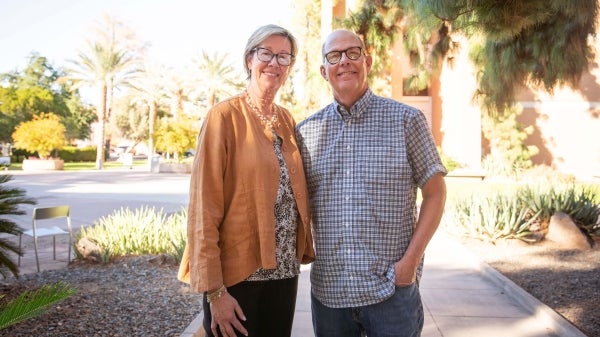Gerhard Wagner to deliver Spring Eyring Lecture Series at ASU

Gerhard Wagner, Elkan Rogers Blout Professor of Biological Chemistry and Molecular Pharmacology at the Harvard Medical School
Gerhard Wagner, Elkan Rogers Blout Professor of Biological Chemistry and Molecular Pharmacology at the Harvard Medical School, is the Spring 2017 Eyring Lecturer at Arizona State University.
The Eyring Lecture is a distinguished lecture series dedicated to stimulating discussion by renowned scientists who are at the cutting edge of their respective fields. Eyring lecturers give two presentations: The first is a more general lecture targeted towards a general audience interested in learning about contemporary scientific problems directly from the scientists contributing to the field, the second is a more technical presentation for practicing scientists and current students.
The general lecture, "Solution NMR from a Chemist’s Tool to Solving Protein Structures," will take place at 6:30 p.m. April 13, in the Physical Sciences H-wing lecture hall H-150 on the Tempe campus.
The techinical lecture, "Engineering Phospholipid Nanodiscs for Membrane Protein Studies," will take place at 3:40 p.m. April 14, in the Physical Sciences H-wing lecture hall H-151 on the Tempe campus.
Previous Eyring lecturers include Nobel prize winners Ahmed Zewail, Jean-Marie Lehn, Richard Smalley and Yuan T. Lee.
Wagner is one of the most influential researchers in the field of NMR studies of protein structures and function. He earned a doctorate in biophysics at the ETH Zurich working with Kurt Wüthrich (1977), where he worked out some of the basic NOE techniques and algorithms for structure determination using NMR data, and published one of the first protein structures to be determined using this new tool. After earning Privatdozent at ETH he moved to the University of Michigan in 1987 as associate professor of biological chemistry, where he continued to develop new NMR techniques for analysis of protein dynamics. In 1990, he moved to Harvard Medical School as professor of biological chemistry and molecular pharmacology.
Wagners' research at Harvard is focused on structural aspects of protein function, and how proteins interact with other macromolecules or small-molecule ligands, and how these interactions relate to biological function using NMR spectroscopy, computational methods and chemical biology approaches.
Wagner was elected Fellow to American Association for the Advancement of Science in 1999, a member of the Deutsche Akademie der Naturforscher Leopoldina (the German National Academy) in 2005, a member of the National Academy of Sciences (US) in 2013 and a member of the American Academy of Arts and Sciences in 2015.
More Science and technology

How a childhood passion led Jim Bell to being named an ASU Regents Professor
In the early 1970s, in a rural town in the smallest state in the U.S., a young boy in elementary school began to imagine the…

Alum's journey to leadership shows the power of lifelong learning
In 1976, Kathy King was among a minority when a high school teacher advised her to pursue chemical engineering at Arizona State…

3 ASU faculty members earn highest honor for early-career scientists, engineers
Three faculty in The College of Liberal Arts and Sciences at Arizona State University have been awarded the Presidential…